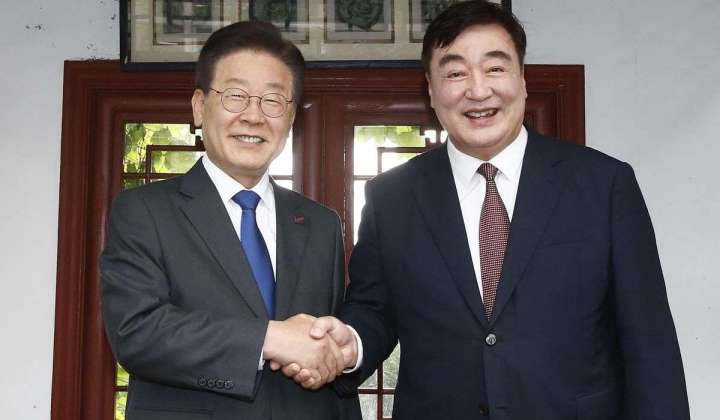South Korea faces China down in diplomatic escalation

SEOUL, South Korea — Following undiplomatic remarks delivered by China’s ambassador to Korea, both sides are escalating — and Washington is backing its ally in Seoul.
The brouhaha suggests South Korea — which is, in the words of President Yoon Suk Yeol administration, a “globally pivotal state” — is increasingly willing to stand up to Beijing despite its deep economic ties to the Communist giant.
Last Thursday, Chinese ambassador to Korea Xing Haiming invited leftist opposition leader Lee Jae-myung, to a dinner. During it, he told Mr. Lee that Seoul would be mistaken to side with the U.S. against China. Mr. Xing also suggested the two nations join forces to resist Japan’s plan to dump irradiated, but treated, water from a stricken nuclear plant into the Pacific.
Unusually, the Chinese embassy publicized Mr. Xing’s comments in a press release.
The conservative Yoon administration has sought to move ever closer to the U.S. and rebuild long-damaged ties with Japan, a fact that Mr. Xing most certainly understands.
Though some Chinese diplomats have earned the sobriquet “wolf warriors” for their vocal advocacy of Beijing’s interests, Mr. Xing is a peninsula expert who has studied in North Korea, speaks fluent Korean, and is currently serving his third term as a diplomat in the Chinese embassy in Seoul.
SEE ALSO: Seoul raps Chinese ‘wolf warrior’ over aggressive rhetoric
He has ignited a spiraling war of words.
Back and forth
On Friday, South Korea responded. South Korean Deputy Foreign Minister Chang Ho-jin summoned Mr. Xing to lodge an official protect over his “unreasonable and provocative” remarks.
On Saturday, China returned fire.
Beijing’s Assistant Foreign Minister Nong Rong called in South Korean Ambassador Chung Jae-ho, and told him it was Mr. Xing’s duty to meet with different persons in South Korea, while hoping that Seoul would reflect on bilateral relations and work with China to promote healthy and stable ties.
On Monday, it was South Korea’s turn once again to keep the dispute roiling.
A South Korean presidential official told local media that poor diplomacy by an ambassador could damage bilateral relations. Separately, Prime Minister Han Duck-so told lawmakers during a session at the National Assembly that “the actions of the Chinese ambassador were highly inappropriate.”
The Biden administration also stepped into the fray this week.
White House national security spokesman John Kirby told reporters the Chinese remarks represented “some sort of pressure tactic.”
“South Korea is a sovereign, independent nation, a terrific ally and a great friend — not just in the region, but around the world,” Mr. Kirby said. “And they have every right to make the kinds of foreign policy decisions they deem are appropriate.”
Seoul upped the pressure again on Tuesday.
A presidential official told local media, “We’re waiting for the Chinese side to carefully consider this problem and to take the appropriate measure.”
The same media reported that Mr. Yoon himself had said, “Our people are offended by Ambassador Xing’s inappropriate behavior.”
China’s aggressive tack is backfiring badly, according to pundits here.
“The basic duty of diplomats is to protect their home country’s interest, but an ambassador is also responsible for maintaining good relations with the host country,” wrote the center-right Joongang Ilbo, South Korea’s second-largest newspaper. “Xing’s words and actions show that he completely gave up diplomatic efforts to open the hearts of the people in the host country.”
Even the left-leaning Hankyoreh newspaper — a staunch critic of the Yoon administration — was critical.
“Xing’s remarks were unusually high-handed. … They sounded like a threat of Chinese retaliation if South Korea does not take Beijing’s side,” the paper editorialized. “It also goes against diplomatic practice to buttonhole an opposition party leader… [and to] subject him to a more than 10-minute open denunciation of the host country’s government.”
Old relations, new relations, strained relations
Historically, China played a dominant role in East Asia, while also transferring its culture — script, governance systems, agricultural systems, cuisine, religions, medicine — to lesser states on its periphery. Today, relations are complex.
China sided with North Korea in the Korean War, and it was not until 1992 that Seoul opened diplomatic relations with Beijing. Commerce flourished. China is today South Korea’s biggest trade partner, as well as a key interlocutor with North Korea.
But tensions simmer. In 2017, U.S. troops in South Korea deployed a U.S.-supplied THAAD anti-missile system. Beijing, angry that its radars could snoop on China, retaliated against Seoul. Sales of South Korean products and K-pop were hit, lucrative Chinese group tours dried up and a South Korean conglomerate exited China’s retail sector.
The previous administration of President Moon Jae-in sought to placate China. The Yoon administration says it wants to pursue diplomatic self-confidence while tightening ties with Tokyo and Washington.
Surveys taken over the last two years find that South Koreans – increasingly angry about issues such as the THAAD reaction, Chinese air pollution and Beijing’s rising assertiveness, exemplified by Mr. Xing’s remarks – now like China less than Japan, the country’s onetime occupier.






